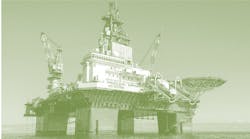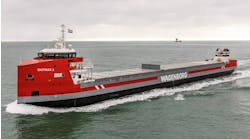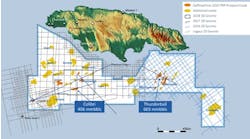Editor's note: This story first appeared in the November-December 2022 issue of Offshore magazine. Click here to view the full issue.
By David Paganie, Chief Editor
Major events can often change the pace and trajectory of industry growth, and a big one this past year was no exception. On Feb. 24, 2022, Russia invaded Ukraine to conduct what Russian President Vladimir Putin called a “special military operation.” Western nations are, in an act of solidarity against the war, imposing economic sanctions on Russia. The country, in turn, has cut off most of its pipeline supply of natural gas to its European customers who rely on the resource for power and heating, to try to force the West to lift the sanctions. This has caused a serious natural gas supply deficit in Europe, and a scramble to secure sufficient resources ahead of winter.
A range of offshore solutions may offer the best near and long-term remedy to the supply crisis, writes Bruce Beaubouef, Offshore managing editor. Since February, European governments and utilities have made up much of the Russian shortfall by purchasing supplies of liquefied natural gas from overseas sources, and by building new infrastructure to access gas produced from the North Sea and offshore Norway.
Check out Bruce’s full report on the European natural gas crisis.
Among the many options under consideration to help offset Europe’s supply deficit include the EastMed Poseidon Pipeline. The proposed 2,000-km pipeline would run from Israel via Cyprus and Greece and up to southeast Italy. In this issue’s guest editorial, Gina Cohen, natural gas analyst, lecturer, and consultant in the Eastern Mediterranean, shares her thoughts on how the region can help Europe secure its energy resource needs.
Offshore is helping Eastern Mediterranean nations accelerate the development of their offshore reserves with the launch of a new subsea technology conference called “Subsea Technology Eastern Mediterranean.” It is being developed in partnership with Cyprus Hydrocarbons Company and an industry advisory board. The inaugural event will be held in Limassol, Cyprus, beginning on May 17, 2023.
Among the other recent major events that have changed industry growth trajectories was the COVID-19 pandemic. It led to hydrocarbon demand destruction, supply chain delays, and a decline in offshore oil and gas activity. Meanwhile, industry companies began to prioritize ESG goals with a focus on lowering their carbon footprint with new investments in renewable energy; and the electrification of offshore rigs, vessels, and hydrocarbon-producing facilities.
The industry’s move towards greater electrification comes from four basic needs and imperatives, writes Bruce Beaubouef. These include the drive to lower emissions, reduce topsides footprint and environmental impact, and lower costs. Bruce elaborates on these imperatives and discusses how this drive toward electrification is being manifested in several different offshore operational areas.
For an operator perspective on ESG initiatives and the energy transformation, Ariana Hurtado, Offshore editor and director of special reports, visited with executives with Talos Energy and Petrobras. The full transcript of Ariana’s interviews can be read inside this issue’s special report, “Offshore Oil & Gas Executive Perspectives.”
On behalf of the entire Offshore team, thank you for your continued support, and best wishes for the New Year.
To respond to articles in Offshore, or to offer articles for publication, contact the editor at [email protected].




